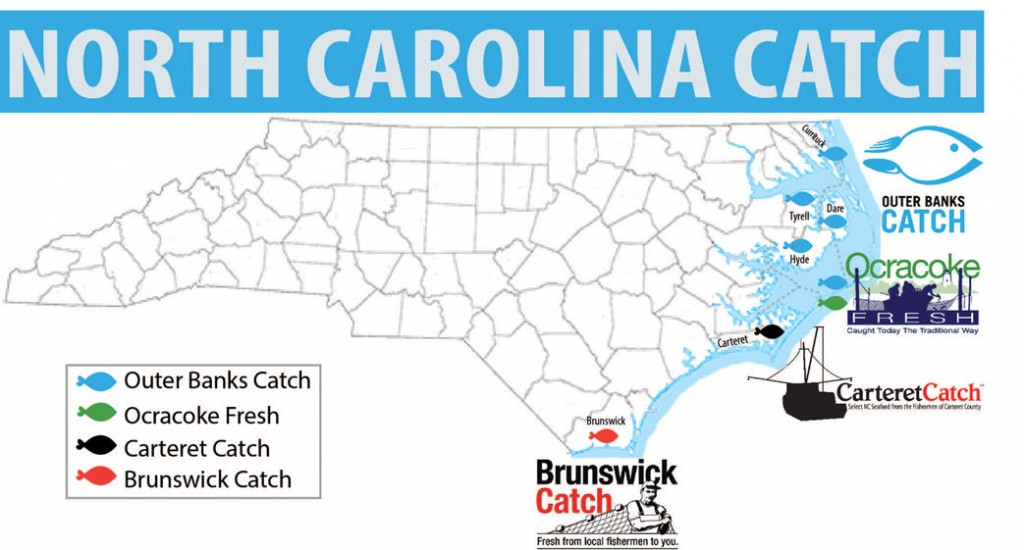Helping Local Fishermen
Increasing Awareness of Local Seafood
Altering the way people purchase seafood requires a behavior change. North Carolina Sea Grant looked at how to change long-term perceptions and behaviors rather than influence short-term purchasing decisions. We provide consumers with information that raises their awareness of an opportunity or an issue so they can make educated choices when selecting seafood.
Branding

Sea Grant collaborated with North Carolina commercial fishermen to brand their seafood. Our extension specialists helped develop and guide Carteret Catch, Brunswick Catch, Outer Banks Catch and Ocracoke Fresh. These local catch programs were designed to distinguish local seafood from the competition, and to sustain the livelihoods and heritage of North Carolina’s commercial fishermen through marketing and public education.
Sea Grant helps local fishermen find new ways to market their catch to consumers.
Marketing Seafood
In 2007, Sea Grant pioneered a community supported fisheries effort, built upon the community supported agriculture business model. Since then, fishermen in Alaska, Australia, California, Connecticut, New Hampshire, New York and South Carolina in the United States, and British Columbia and Nova Scotia in Canada have embraced the CSF model.
Those who operate or belong to CSFs now sell seafood at premium prices to customers who value not only local products, but also a personal relationship with their fisherman. Direct sales also mean more money returning to fishing communities, which enhances their economic vitality.
We also assist our industry partners in developing novel seafood products that are healthy, flavorful and easy to prepare at home or at work. By adding convenience to the consumption of local seafood, Sea Grant is helping coastal processors diversify their revenue streams while making local seafood more available to in-state consumers.
Sea Grant collaborated with UNC-TV on a 2013 project to promote local catch.
We also work on consumer awareness.
Links
- Value-Added Technology: Developing a Smoked Soft Crab
- A Comparative Case Study of Virginia and North Carolina’s Oyster Aquaculture Development
- A Supply Chain Analysis of North Carolina’s Commercial Fishing Industry
- Ready-To-Sell: Developing Value-Added Seafood Products
- New Business Models for Small-Scale Fishermen and Seafood Processors
- Using the Internet to Enhance Direct Market Sales of Seafood
- Fresh, Local is Preferred: Protecting the Quality of Wild-Caught Shrimp
- Branding Seafood: Developing a Marketing Plan to Sell Value-Added Seafood Products
- Handling Seafood Safely/El Manjeo Seguro De Los Mariscos
- A Self-Guide to Hazard Analysis & Critical Control Point Inspection for Small Seafood Dealers, Packers and Processors
- Hazard Analysis and Critical Control Point: A Self-Guide to HACCP Inspection for Small Seafood Dealers, Packers and Processors
Other Resources
- GMPs: Good Manufacturing Practices Online Training and Education, a distance-education, food-safety curriculum developed by Sea Grant seafood technology specialists from Delaware, Florida, New York, North Carolina, Rhode Island, Virginia and the United States Food & Drug Administration.
- Basic Seafood HACCP Online Training Course
- Seafood Network Information Center
